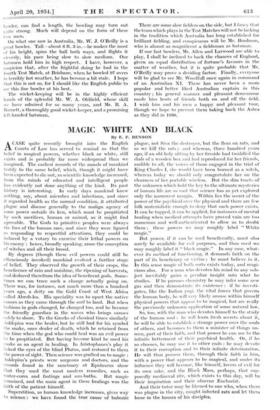MAGIC WHITE AND BLACK By E. F. BENSON A CASE quite
recently brought into the English Courts of Law has served to remind us that the belief in magical powers, whether black or white, still exists and is probably far more widespread than we imagined. The earliest records of the annals of mankind testify to the same belief, which, though it might have been expected to die out, as scientific knowledge increased, from the minds of educated and intelligent people has evidently not done anything of the kind. Its past history is interesting. In early days mankind knew nothing, say, about microbes and infections, and since it regarded health as the normal condition, it attributed plague and disease generally to the malign agency of some power outside its ken, which must be propitiated by such sacrifices, human or animal, as it might find agreeable. The Gods to primitive peoples were always the foes of the human race, and since they were figured as responding to respectful attentions, they could be induced by a votary to exercise their lethal powers on his enemy : hence, broadly speaking, arose the conception of witches and all their brood.
By degrees (though these evil powers could still be efficaciously invoked) mankind evolved a further stage of belief. They observed the growth_ of their crops, the beneficence of rain and sunshine, the ripening of harvests, and deduced therefrom the idea of beneficent gods. Some- times we can trace such a change actually going on. There was, for instance, not much more than a hundred years ago, a deity on the Gold Coast of West Africa called Abroh-ku. His speciality was to upset the native canoes as they came through the surf to land. But when fashions in gods changed, he changed too, and he became the friendly guardian in the waves who brings canoes safely to shore. To the Greeks of classical times similarly Asklepius was the healer, but he still had for his symbol the snake, once dealer of death, which he retained from the time when the god who could heal was an evil power to be propitiated. But having become kind he used his snake as an agent in healing. In Aristophanes's play it licked the eyes of the blind Plutus, and restored to them the power of sight. Then science was grafted on to magic Asklepius's priests were surgeons and doctors, and the records found in the sanctuary at Epidaurus show that they used the most modern remedies, such as water-cures and fastings and sun-baths. But magic remained, and the main agent in these healings was the faith of the patient himself.
Superstition, as human knowledge increases, gives way to science : we have found the true' cause .of bubcniit plague, not Siva the destroyer, but the fleas on rats, and so we kill the rats ; and whereas, three hundred years ago, if an old lady sitting by her fireside had twiddled the dials of a wooden box and had reproduced for her friends, audible to all, the voices of those engaged in the trial of King Charles I, she would have been burned as a witch, whereas today we should only congratulate her on the clearness of her portable wireless. But the dim tracts of the unknown which hold the key to the ultimate mysteries of human life arc so vast that science has as yet explored only the narrowest margin. Within lies the secret of the power of the psychical over the physical and there are few folk materialistic enough to deny that such power exists. It can be tapped, it can be applied, for instances of mental healing when medical attempts have proved vain are too numerous and well-authenticated to allow us to doubt them : these powers we may roughly label " White magic."
But power, if it can be used beneficently, must also surely be available for evil purposes, and thus used we may roughly label it " black magic." In any case, what- ever its method of functioning, it demands faith on the part of its beneficiary or victim : he must believe in it. In this sense magic of both sorts exists today, and magi- cians also. For a man who devotes his mind to any sub- ject inevitably gains a peculiar insight into what he studies. If he pursues chemistry he may infer some new gas and then demonstrate its existence : if he investi- gates, like the Indian yogi, the vital forces that govern the human body, he will very likely arouse within himself physical powers that appear to be magical, but arc really the previously unknown application of some natural law.
So, too, with the man who devotes himself to the study of the human soul : he will learn fresh secrets about it, he will be able to establish a strange power over the souls of others, and becomes to them a minister of things un- seen, part of their faith, and that power he can use to the infinite betterment of their psychical health. Or, if he so chooses, he may use it to other ends : he may devote it to their corruption and to their infinite deterioration. He will thus possess them, through their faith in him, with a power that appears to be magical, and under its influence they will become, like himself, lovers of evil for its own sake, and the Black Mass, perhaps, that sup- posedly mediaeval rite, which exists to this day, will be their inspiration and their obscene Eucharist.
And their tutor may be likened to one who, when there was plague in the city, caught infected rats and let them loose in the houses of his disciples.












































 Previous page
Previous page